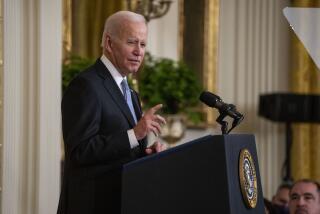Governing isn’t campaigning
Barack Obama made running for president look easy. As a candidate, he was famously steady and cool, and his campaign team was a marvel of internal harmony. “No drama Obama,” they called him.
Fixing a broken economy is turning out to require some drama. To win his stimulus plan, Obama had to turn white-hot and warn that the alternative was “catastrophe.” Backstage at the White House, there has been confusion and even discord, evidence that Team Obama might be populated by mortals after all.
The stimulus plan was a real victory that gave Obama, after relatively brief congressional brawling, most of what he wanted in the first place. But Treasury Secretary Timothy F. Geithner’s rollout of a financial rescue plan that wasn’t ready for prime time was a real setback -- a self-inflicted wound that exposed apparent conflict inside the administration.
Obama and Geithner made a rookie mistake: They billed the Treasury secretary’s speech as a “comprehensive plan” when the most important piece wasn’t ready. They over-promised and under-delivered.
Administration officials apparently felt pressure from the global credit markets to say where they were heading. But they would have done themselves a favor if they had described Geithner’s speech as an interim report, not a comprehensive plan.
Geithner’s brutal candor -- “We will have to try things we never tried before. We will make mistakes” -- didn’t reassure a nervous market either.
Most intriguing for Obama-watchers, the half-finished plan forced signs of internal discord to the surface. Before the speech, the New York Times reported that the Treasury secretary had fought off pressure from Obama’s chief political strategist, David Axelrod, for tougher conditions on financial institutions.
After the speech, Axelrod’s defense of Geithner was less than ringing. “Wall Street was hoping for a complete answer to some really complex and expensive problems, and what Secretary Geithner laid out didn’t meet those expectations,” he said, accurately. Others in the administration privately agreed that the rollout turned a proposal that should have been a public hit (it includes big increases in help with mortgages and consumer loans) into an unforced error. That kind of internal tension was almost invisible before Jan. 20.
Take the short view -- the last two weeks -- and the Obama presidency has clearly run into turbulence. “Some may call it amateur hour,” Obama’s chief of staff, Rahm Emanuel, acknowledged with a sardonic smile last week.
Take a longer view, though, and the new administration has accomplished quite a bit in less than a month: a stimulus bill that genuinely qualifies as “unprecedented,” a half-plan for fixing the nation’s credit markets, and first steps in a dozen other areas. Most of the troubles probably can be attributed to the struggle to learn the difference between campaigning and governing, a challenge that has bedeviled every governor and senator who ever won the presidency.
Emanuel, who survived six years as a top aide in the often-chaotic Clinton White House, waved aside the stumbles in a Thursday session with reporters, calling the stimulus plan he negotiated “the most major, comprehensive legislation relating to economic activity ever.”
But Emanuel also was candid about the administration’s room for improvement, at least on some counts. The president and his aides talked too confidently, at first, about the prospects of bringing Republicans on board, he said. “There’s an insatiable appetite for the notion of bipartisanship here, and we allowed that to get ahead of ourselves,” he said.
And he acknowledged the problems with Geithner’s speech. “There was clearly a reaction by investors,” he said, but added that the real measure will be whether the Treasury now succeeds in fixing the credit markets.
On the whole, he pronounced himself more than satisfied with the accomplishments of Obama’s first four weeks. “The president has always indicated there will be days when there are setbacks, days when there will be disappointments, but as long as we’re moving forward, those will be bright days,” Emanuel said. “Let’s be honest: Will the economic recovery or Judd Gregg be a bigger discussion point a week from now?”
New presidents and their staffs always hit unexpected obstacles in their first months. Some former Obama campaign aides are still marveling at how different governing is from campaigning.
But the administration’s ranks also include people who have seen presidents come and go, and who (if they were paying attention) learned lessons from what they saw. The Clinton White House demonstrated that a presidency can survive very bad days if it stays focused on its central goals. The Bush White House showed that denying your mistakes is not always good politics. Obama’s White House appears to be trying, amid turbulence, to apply both of those lessons.
--
More to Read
Get the L.A. Times Politics newsletter
Deeply reported insights into legislation, politics and policy from Sacramento, Washington and beyond. In your inbox three times per week.
You may occasionally receive promotional content from the Los Angeles Times.











